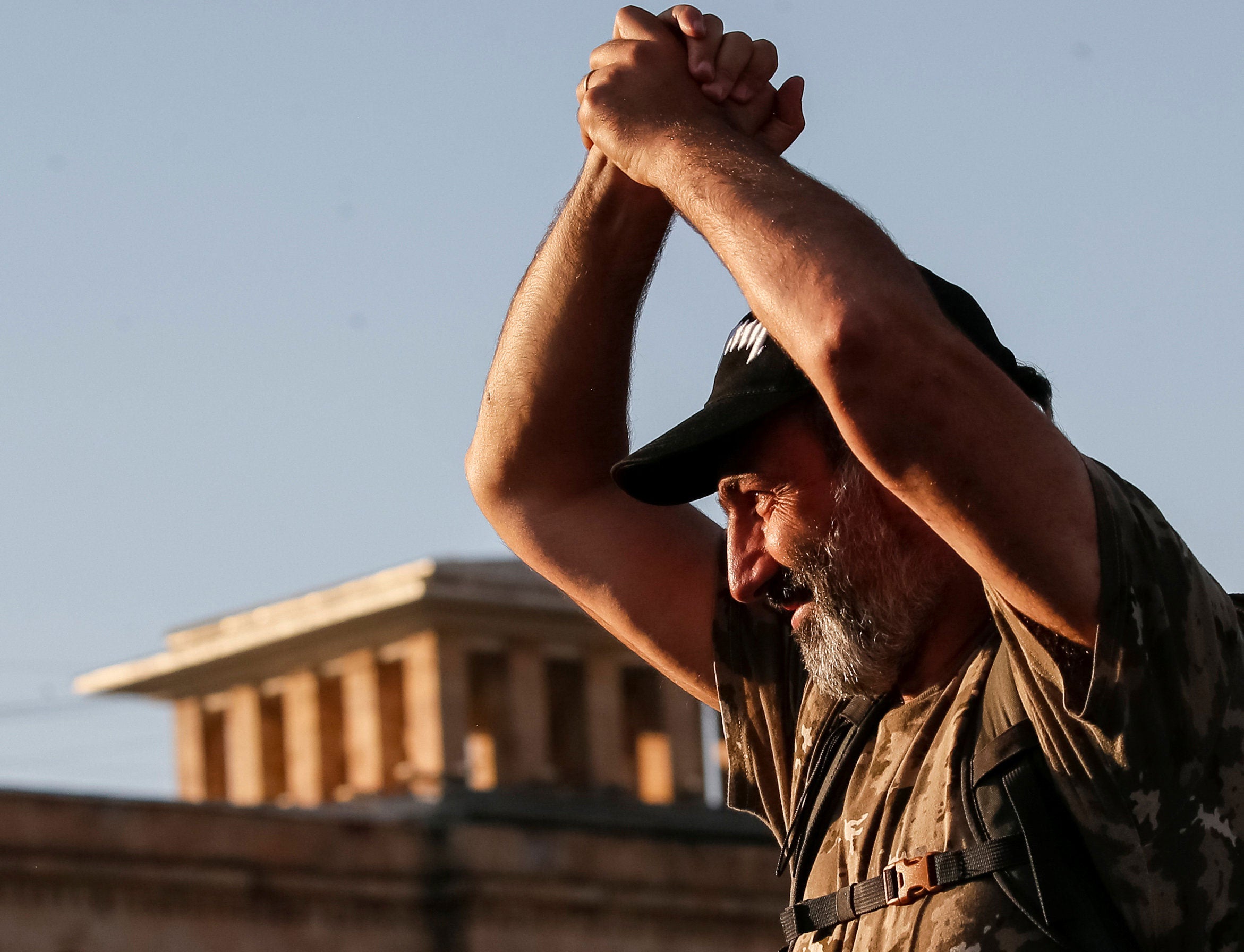Armenia's protest leader claims victory after national lockdown
Roads, railways and airports grind to a halt in day of civil disobedience

Your support helps us to tell the story
From reproductive rights to climate change to Big Tech, The Independent is on the ground when the story is developing. Whether it's investigating the financials of Elon Musk's pro-Trump PAC or producing our latest documentary, 'The A Word', which shines a light on the American women fighting for reproductive rights, we know how important it is to parse out the facts from the messaging.
At such a critical moment in US history, we need reporters on the ground. Your donation allows us to keep sending journalists to speak to both sides of the story.
The Independent is trusted by Americans across the entire political spectrum. And unlike many other quality news outlets, we choose not to lock Americans out of our reporting and analysis with paywalls. We believe quality journalism should be available to everyone, paid for by those who can afford it.
Your support makes all the difference.It was supposed to have been a day of defeat for Armenia’s protest movement, its man Nikol Pashinyan having been denied the premiership in a parliament vote on Tuesday. But as citizens answered his call for a day of civil disobedience, the mood on the streets was anything but sombre.
From half eight in the morning, the main arteries in the capital Yerevan were shut off one by one. Checkpoints appeared on roads to the airport. Airport workers declared a strike, closing the country’s major air hub. The metro shut down. Railways followed. Roads to the border in Iran were shuttered in both directions. The border crossing with Georgia was blocked off, leaving 300 trucks stranded.
By late morning, the country was in total lockdown, save for the impromptu taxi shuttle services that operated between the roadblocks.
But few of the affected drivers seemed perturbed by the difficulties, shrugging their shoulders before turning around. Police looked on, disinterested, some with filterless cigarettes hanging out of their mouths. And far from wallowing in despair, the protesters revelled in their moment. They shared out food – kebabs, sticky buns and ice cream. Some played volleyball.
As the day went on, the crowds grew in numbers, pulled in towards Republic Square, the de facto headquarters of Armenia’s revolution. They arrived on anything they could lay hands on – rubbish trucks, lorries, ambulances, JCBs – hooting their horns in deafening chorus.
The airport began working again at 2pm, and roads opened three hours later in time for speeches on the square. On both occasions, it was Mr Pashinyan’s order that turned off the switch .
“It is quite amazing: he says do this, and everyone follows,” says Areg Balayan, a photographer and Pashinyan supporter. “Every evening he gives the orders. He says pick up rubbish, and the people pick up rubbish; he says picket, and they picket; he has complete control of the street.”
The charismatic former journalist has certainly defined the agenda since protests against the rule of Serzh Sargsyan and his Republican Party began in April. There have been a series of improbable victories — first the long-term leader’s resignation, then a guarantee that the ruling party will not contest the premiership.

With parliamentary arithmetic against him, those victories were never complete. And yesterday’s vote of 55 to 45 seemed to kick protesters' ambitions into the long-grass. The anticipation among many was that the ruling party would look to duplicate the vote in the repeat process next week, then reassert their advantage in new and falsified election.
But Mr Pashinyan today turned the page from yesterday’s disappointment. Speaking at an evening rally, he said that the ruling party now understood the game was up. They had given him assurances they would support his candidacy, he added — but he would wait to see those promises on paper.
News of defections and the resignation of an acting minister fuelled rumours of the impending demise of the old guard.
“Today was a big success as it allowed Pashinyan to re-capture the initiative,” said Mikael Zolyan, an independent political analyst.
“He still he has to keep up this pressure for a week, to make sure that the Republican Party surrenders before that, but it's hard to say precisely how that surrender could be formalised before the voting”.
At the rally, Mr Pashinyan urged supporters to believe – not in him, but in themselves. For many, that may be late. The opposition leader has already become somewhat of a national saviour, a messiah.
One long-time fan, Shushan, 18, could be seen holding a print-out portrait of the protest leader. Below Pashinyan's trademark camouflage T-shirt read the word “courage”.
“I’ve loved Nikol for many years,” Shushan told The Independent. “He’s a good man because people love him. And if they love him it means he is good.”
Join our commenting forum
Join thought-provoking conversations, follow other Independent readers and see their replies
Comments